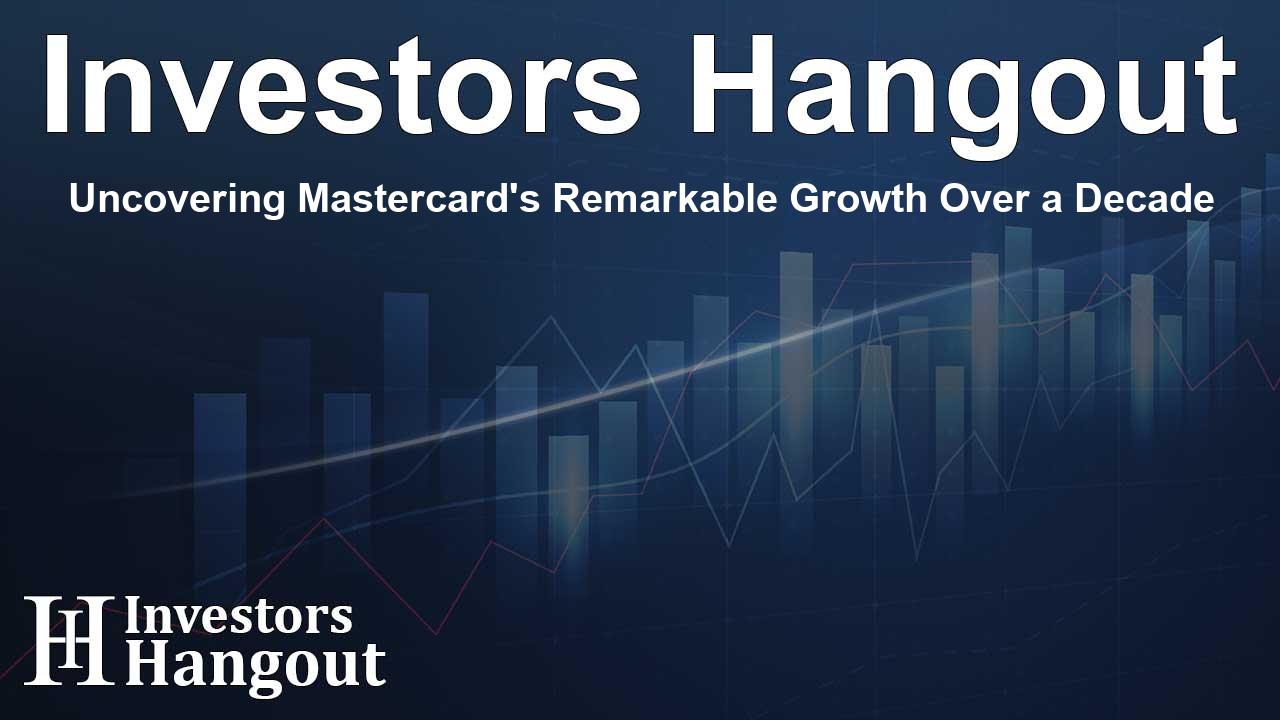Uncovering Mastercard's Remarkable Growth Over a Decade

Uncovering Mastercard's Remarkable Growth Over a Decade
Mastercard (NYSE: MA) has truly showcased its strength over the past decade, leaving a remarkable imprint in the financial markets. With a solid market performance surpassing the overall market by an impressive 9.53% annually, it has achieved an average return of 20.69%. As of now, Mastercard boasts a substantial market capitalization of approximately $452.42 billion.
Investing in Mastercard: The Details
To illustrate the powerful returns that an investment in Mastercard could bring, consider this scenario. An early investor who purchased $1,000 worth of MA stock 10 years ago would find their initial investment has grown significantly. As the stock price is currently around $489.72, that initial investment is now valued at around $6,357.95.
Understanding the Impact of Compounding Returns
This stunning growth can be attributed largely to the effects of compounding returns. The journey of investing is often not just about how much you invest, but also how long you let your money work for you. Compounding allows your investments to generate earnings, which in turn can earn more money.
The Broader Market Context
In the context of the broader stock market, Mastercard's consistent performance stands out. Numerous external factors may influence stock prices, including economic conditions, competitive landscape, and regulatory changes. Nonetheless, Mastercard's strategic positioning in the global payments industry has enabled it to thrive despite these fluctuations.
Guiding Future Investors
As new investors consider potential additions to their portfolio, the historical performance of Mastercard presents a compelling case. The growth recorded over the last ten years serves as a beacon for understanding the power of long-term investments. Investors should assess not just past performance but the fundamental strengths of the company that position it well for future growth.
Key Takeaways from Mastercard's Growth
The essential insight derived from Mastercard's investment journey is that long-term investments have the potential to yield valuable rewards. Observing the substantial difference that compounding can make, individuals contemplating investing should take a closer look at Mastercard's impressive track record.
Frequently Asked Questions
What is the annual return rate for Mastercard over the last 10 years?
Mastercard has achieved an average annual return of 20.69% over the past decade.
How much would a $1,000 investment in Mastercard be worth today?
A $1,000 investment in Mastercard made 10 years ago would be valued at approximately $6,357.95 today.
What is Mastercard's current market capitalization?
Mastercard currently has a market capitalization of roughly $452.42 billion.
Why is compounding important in investing?
Compounding allows your investments to grow exponentially over time by earning returns on both the initial principal and the accumulated interest.
What industry does Mastercard operate in?
Mastercard operates in the global payments industry, providing essential services and technologies for transaction processing.
About Investors Hangout
Investors Hangout is a leading online stock forum for financial discussion and learning, offering a wide range of free tools and resources. It draws in traders of all levels, who exchange market knowledge, investigate trading tactics, and keep an eye on industry developments in real time. Featuring financial articles, stock message boards, quotes, charts, company profiles, and live news updates. Through cooperative learning and a wealth of informational resources, it helps users from novices creating their first portfolios to experts honing their techniques. Join Investors Hangout today: https://investorshangout.com/
Disclaimer: The content of this article is solely for general informational purposes only; it does not represent legal, financial, or investment advice. Investors Hangout does not offer financial advice; the author is not a licensed financial advisor. Consult a qualified advisor before making any financial or investment decisions based on this article. The author's interpretation of publicly available data shapes the opinions presented here; as a result, they should not be taken as advice to purchase, sell, or hold any securities mentioned or any other investments. The author does not guarantee the accuracy, completeness, or timeliness of any material, providing it "as is." Information and market conditions may change; past performance is not indicative of future outcomes. If any of the material offered here is inaccurate, please contact us for corrections.